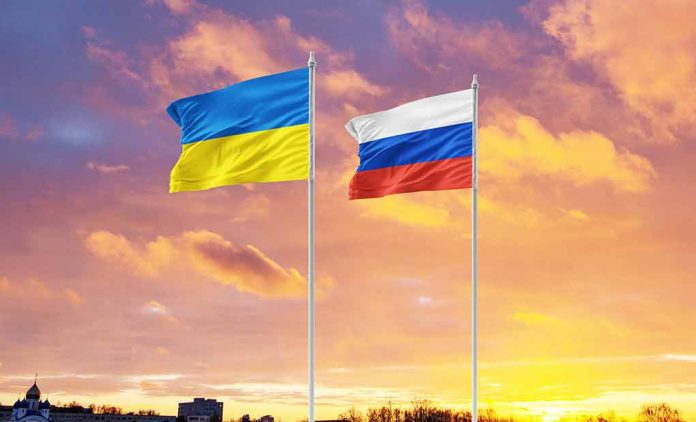
A dramatic escalation in the Ukraine-Russia conflict has Russia threatening retaliation after a missile attack on a southern factory.
At a Glance
- Russia accused Ukraine of striking a military airfield in Rostov with Western missiles.
- President Putin issued threats of using hypersonic ballistic missiles.
- US approval for Ukraine’s use of long-range weapons has increased tensions.
- Both countries ramp up attacks ahead of possible ceasefire discussions.
Conflict Escalation
Russia has accused Ukraine of attacking a military airfield in the Rostov region using Western-supplied missiles. Among these were advanced systems like the US ATACMS and British Storm Shadow missiles. This accusation comes after missiles hit a chemical and ammunition facility in southern Russia. Russia’s defense ministry claimed that some incoming missiles were intercepted by its defensive systems.
President Putin has expressed serious concerns over these developments by threatening the use of hypersonic ballistic missiles against Kyiv if Ukraine continues such operations. The US has recently given Ukraine the green light to utilize long-range weapons, further exacerbating the situation and drawing sharp criticism from Moscow.
UK intel: Russia’s Oreshnik missile likely deployed for strategic messaging
Russia likely used its expensive, experimental Oreshnik missile as symbolic retaliation for Ukraine’s Western missile use, despite limited production, per UK intelligence.https://t.co/lGFuIAyQJA
— Euromaidan Press (@EuromaidanPress) November 29, 2024
Territorial and Aerial Engagements
Russia claimed it recaptured certain territories in the Kursk region from Ukrainian control. Concurrently, Ukraine launched six ATACMS missiles targeting a military airfield in Taganrog, though some were reportedly intercepted. Ukraine has announced successful strikes on Russian military and energy facilities, including an oil depot in Bryansk. Meanwhile, both countries have escalated their aerial engagements, an indicator of possible strategic positioning before any ceasefire talks.
“This attack by Western long-range weapons will not go unanswered and appropriate measures will be taken,” warned Russia’s defense ministry.
Increased aerial attacks have occurred alongside these tensions. Russian forces conducted a significant aerial assault on Ukraine, releasing 93 cruise and ballistic missiles, complemented by nearly 200 drones. Ukraine’s air defenses made substantial interceptions, notably shooting down 11 cruise missiles deploying F-16 jets supplied by Western allies.
International Reactions and Implications
Amid heightened hostilities, diplomatic interactions continue. Hungary’s Prime Minister Orban’s discussions with President Putin have drawn criticism from Ukraine, as President Zelensky emphasizes the need for European unity against Russia. The US has reiterated its support for Ukraine, pledging air defense systems alongside nearly $1 billion in security aid to bolster Ukraine’s defenses.
“No one should boost their personal image at the expense of unity, everyone should focus on shared success. Unity in Europe has always been key to achieving it,” President Zelensky stressed.
The conflict has severe implications for civilian infrastructure. Russian missile strikes aimed at Ukraine’s energy sector have resulted in ongoing blackouts. Half of Ukraine’s energy infrastructure faces destruction, representing a strategic attempt to undermine civilian morale and disrupt the nation’s defense manufacturing. Hypersonic missiles, used by Russia recently, pose novel threats with expected further utilization.








